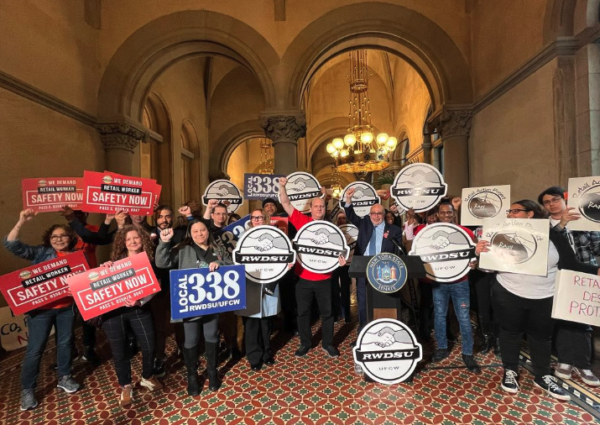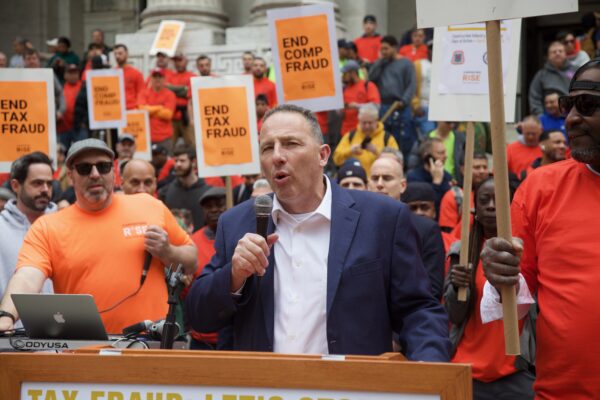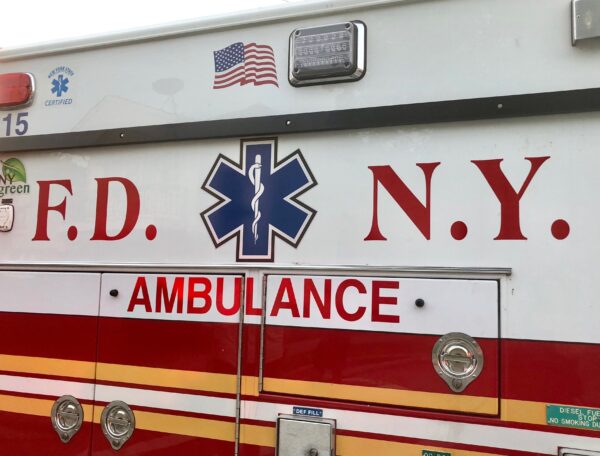April 15, 2015
By Joe Maniscalco
Brooklyn, NY – Calling the establishment of a $15 an hour minimum wage an "economic imperative," NYC Scott Stringer on Tuesday released a new report showing that raising the wage would put more than $10 billion in the pockets of 1.5 million working men and women throughout the five boroughs, while also slashing municipal costs and boosting businesses.
"The numbers don't lie," Stringer said outside a Fulton Mall McDonald's on April 14. "Raising the minimum wage to $15 an hour will be a $10 billion boost to the economy."
According to the comptroller's report, raising the minimum wage to $15 an hour would mean an annual wage increase of $3 billion for more than 900,000 workers in Brooklyn and Queens. Another 250,000 workers in the Bronx would see a $2 billion boost, while some 237,000 workers in Manhattan would enjoy a $1.6 billion raise. A smaller number of 52,000 Staten Island workers would benefit from a $311 million raise.
The impressive-sounding numbers mean that the typical low-wage worker in the retail and healthcare industries could be earning $150 more each week.
"If we are serious about tackling income inequality in all five boroughs, raising the minimum wage is one of the most single effective tools that we have," Stringer said.
With more buying power, the comptroller projects consumers could spend up to $1,800 more each year on housing, $600 more on groceries, $400 more on entertainment and $300 more on healthcare.
In less than five years, there could also be 90,000 fewer families spending half their earnings on rent, while the number of households earning less than $30,000 annually could be reduced by nearly 170,000.
The City of New York, meanwhile, could reduce its public assistance expenditures anywhere from $200 to $500 million, according to the comptroller's numbers crunching.
“We have the moral ground to say that this is right, but thanks to the comptroller, we also have the economic fundamentals that this is good for the economy,” said 32BJ SEIU President Hector Figueroa.
Despite the stellar numbers and the moral mandate, critics of a $15 an hour minimum wage charge that small businesses simply can’t afford to raise the pay floor for low-paid workers.
Stringer conceded that the city needs to do more to aid small businesses, but warned against pitting them against workers, maintaining that a $15 an hour minimum wage would be a "win" for both small businesses and working families.
“By paying $15 an hour, small business owners will get the kind of loyalty and longevity that will grow their businesses,” the comptroller said. “I believe that there's enough we can do to elevate our small businesses.”
Michael Kink, executive Director of the Strong Economy For All Coalition, pointed to Seattle, Washington as a model that New York City needs to replicate.
“They've got the highest minimum wage in the country and they’ve got the fastest rate of small business growth,” Kink said. “This does not have to pit people against people. If we grow the economy from the bottom up, we're going to have a stronger economy for everybody. This report proves it.”
Tuesday’s Fulton Street really occurred on the eve of April 15’s massive $15 an hour minimum wage rally slated for over 200 cities around the country.
“It's an outrage and a disgrace to keep making [a low] minimum wage for a maximum wage company,” said Papa John’s employee Shantel Walker. “We've had enough of this.”



